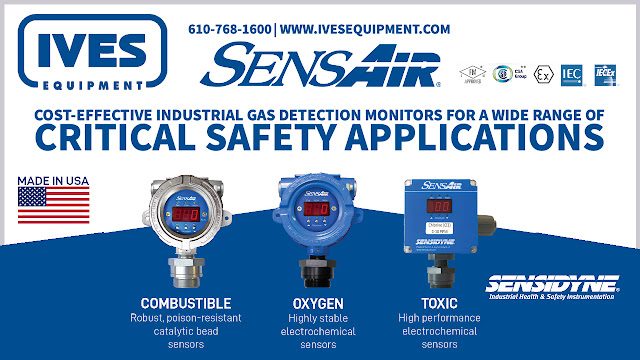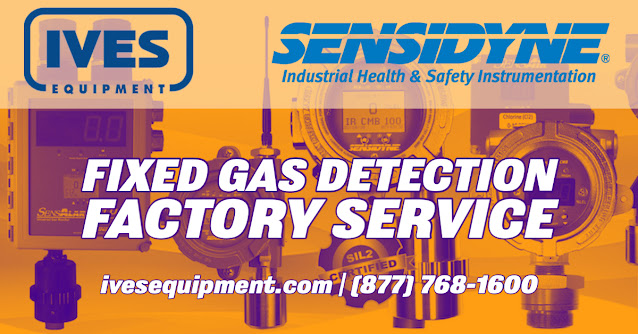Educational information on process control, industrial instrumentation, valves, valve automation and control valves. For additional information visit IvesEquipment.com or call 877-768-1600
Low Cost Toxic, O2 and Combustible Fixed-point Gas Detection
Industrial Gas Detection Monitors at Low Cost for a Wide Range of Critical Safety Applications
Fixed Gas Detection Factory Service from Sensidyne and Ives Equipment
Fixed gas detectors are commonly found in large industrial facilities where explosive or noxious fumes, vapors or liquids exist. Fixed gas detectors are used to identify significant leaks and provide an early warning of leaking from a specific system. Relays and adjustable alarm point settings are used to configure fixed gas detection systems. Fixed gas detectors respond swiftly to atmospheric threats thanks to these settings. Opening and closing ventilation and exhaust fans, triggering visual and audio alerts, and closing valves are just a few of the functions they can do.
Industrial safety professionals understand how critical it is to keep essential safety instruments calibrated and serviced. Infrequent sensor calibration reduces the accuracy of gas detection readings and may result in the failure to detect gas leaks, resulting in an unprotected zone.
And now might be a good time to perform some preventative maintenance.
How Often Should You Calibrate Your Toxic/Flammable Gas Detector?
When we think of gas detector calibration and how often it must be performed, it is dependent on many variables. First and foremost is determining if a gas sensor is out of calibration.
The best way to establish this is through a “bump” or functional test using a certified standard gas mixture of known concentration. If the device is functioning properly and still measuring gas within tolerance, calibration is unnecessary. Bump testing should be performed as regular maintenance on any gas detector. With the frequency depending on the sensor technology, manufacturer recommendations, specific company standard operating procedures and environment.
The two most common sensor types are NDIR and Electrochemical.
NDIR sensors tend not to drift and are calibrated prior to shipment. They require a bump testing frequency of 6 months or less to ensure performance is consistent. Calibration is only necessary if bump testing indicates the sensor is out of specification. Electrochemical sensors tend to drift over time and require bump testing every 3 to 6 months. Calibration is recommended annually or if bump testing indicates an out of spec sensor.
Due to the technology of electrochemical sensors, they will deplete over time and more rapidly if exposed to the target gas. They can also be poisoned if exposed to certain gases. If this is a risk, then bump testing more frequently is prudent. Calibration frequency can also be dependent on gas detector relevance. If it is a portable device, then it is pragmatic to bench calibrate before utilizing it in the field. If an area is planned to have significant traffic or work, then calibration should be performed for this event.
The sensor technology industry is constantly evolving, and with that newer sensors are assuring longer periods between calibration, or potentially no need to calibrate at all.
Using newly developed materials and software, sensors may last thousands of cycles without any performance decay, even if exposed to extreme environments or chemicals. The future is markedly promising.
Remember, the most important reason to calibrate your Vanguard Gas Detector is to provide accurate gas concentration readings in order that it could prevent illness, injury or death to personnel in the area. Your Vanguard may be exposed to extreme environments such as high or low temperatures, high or low humidity, or even harsh chemicals that may require more frequent calibration. With proper maintenance, your Vanguard can provide the safety your team deserves.
For more information about fixed toxic and flammable gas detection systems contact Ives Equipment. Call them at (877) 768-1600 or visit their website at https://ivesequipment.com.
An Advanced, Single Housing, All-In-One Gas Detection System
SensAlarm Plus is a complete, turn-key gas detection system preassembled in one housing. The system comes standard with strobe lights, horns, high-visibility four-digit LED display, and LCD display/interface. At the heart of the SensAlarm Plus is an advanced Intelligent Sensor platform with non-volatile memory for all critical application variables and sensor data. A non-intrusive user interface enables easy operator customization and a quick review of sensor life parameters, TWA (Time Weighted Average) alarms, calibration data, and other information with date and time recording.
The SensAlarm Plus sensor head is universal in that it accepts all Sensidyne Plus sensors. Monitoring in high, low, or adjacent locations is simplified by remote mounting the sensor head using a four-conductor cable. With a sensor connected, the automatic uploading of variables, alarm values, and sensor information dramatically simplifies installation and maintenance. Transportable calibration allows sensor calibration at the installation location or in a workshop, then hot-swapping the sensor in the field.
SensAlarm Plus is the ideal gas monitoring solution for many applications. Most laboratories, gas cylinder storage facilities, industrial work areas where gases are present, control room protection or other applications where users benefit from a packaged gas detection system are common areas that need SensAlarm Plus.
DOWNLOAD THE SENSALARM PLUS DATA SHEET FROM THIS IVES EQUIPMENT WEB PAGE
For more information about Sensidyne Fixed Gas Detection products, contact Ives Equipment. Call them at 877-768-1600 or visit their website at https://ivesequipment.com.




